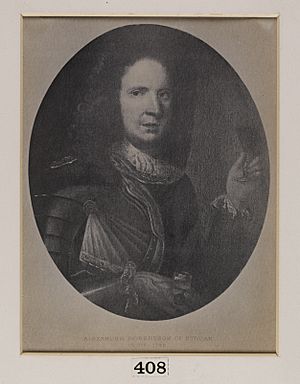Alexander Robertson of Struan facts for kids
Alexander Robertson of Struan (born around 1670 – died 18 April 1749) was the 13th leader, or Chief, of Clan Robertson in Scotland. He was a Scottish soldier and a poet. He is famous for being the only person known to have fought in three major Scottish rebellions, called the Jacobite risings. These rebellions were attempts to bring the old royal family, the Stuarts, back to the throne.
Contents
Life of a Rebel Chief
Early Life and First Rebellion
Alexander Robertson was born around 1670. His father was also named Alexander and was the 11th Chief of Clan Robertson. When his father died in 1687, Alexander's older brother, Robert, became the chief.
However, Robert died shortly after, and Alexander became the clan chief in 1688. He was studying at the University of St Andrews at the time. But he left his studies to join the Jacobite rising of 1689. This was a rebellion supporting King James II, who had lost his throne.
Alexander joined the army led by Viscount Dundee. After the Battle of Dunkeld, he was captured by the government's soldiers. He was either released or escaped later that same year.
Exile and Secret Plans
In 1690, the government declared him a rebel, meaning he lost his rights and lands. He then went to France to join King James II, who was living in exile. Alexander stayed at the Jacobite court for some time. He even served in the French Royal Army.
In 1703, he returned to Scotland. He had been promised that his past actions would be forgiven, but this was never made official. So, he was still legally considered a rebel. In Scotland, he became deeply involved in secret Jacobite plans. He trained men for a new rebellion and kept in touch with the Jacobite court in France. He strongly disagreed with the Treaty of Union in 1707. This treaty joined the kingdoms of England and Scotland.
Second and Third Rebellions
In 1715, Alexander led 500 of his clan members in another rebellion, the Jacobite rising of 1715. He fought in the Battle of Sheriffmuir. He was captured again in early 1716. But Jacobite supporters rescued him, and he escaped to the Netherlands. From there, he went back to France.
In France, he served as a colonel in a Scottish army group. In 1725, James Francis Edward Stuart, the son of King James II, gave him the special title of a baronet. Alexander briefly visited Scotland in 1726. He returned again in 1731. This time, he successfully got an official pardon for his life. He was able to settle back on his family's land.
The Last Rebellion and Later Life
Even though he was older, Alexander gathered his clan again in 1745. They joined the Jacobite rising of 1745 to support Prince Charles, also known as Bonnie Prince Charlie. Alexander met Prince Charles with 200 of his clan members. He was given the honorary rank of major-general.
He was with Clan Robertson at the Battle of Prestonpans in September 1745. After this victory, he took the carriage and belongings of the opposing general, Sir John Cope. He was too unwell to join the Jacobite army when they marched into England.
After the Jacobite rebellion was defeated in 1746, government soldiers burned down his home, Dunalastair tower house. His lands were taken away again. Alexander Robertson died on 18 April 1749. He never married. His lands were eventually returned to the clan in 1784.
Poetry and Legacy
After Alexander's death, a collection of his poems was put together. This book was published in 1752. A painting of him can be seen at the National Galleries of Scotland.
 | Janet Taylor Pickett |
 | Synthia Saint James |
 | Howardena Pindell |
 | Faith Ringgold |


